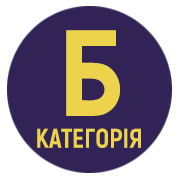INDEPENDENT ACTIVITY OF STUDENTS WITH INTELLECTUAL DISABILITIES IN UKRAINIAN LANGUAGE LESSONS
DOI:
https://doi.org/10.32782/ped-uzhnu/2023-2-1Keywords:
children with intellectual disabilities, independent exercises, Ukrainian language lessonAbstract
The purpose of this article is to reveal the peculiarities of the organization, means and stages of the formation of independent activity of students with intellectual disabilities in the Ukrainian language lessons. One of the important tasks set by the New Ukrainian School is to educate a thinking person who would be able to analyze, compare, generalize, independently obtain information, express their opinions, draw conclusions. This is especially important for children with special educational needs, in particular children with intellectual disabilities. In this context, the teacher faces the problem of finding effective ways and innovative approaches that will contribute to the implementation of the main task – to teach children with intellectual disabilities to learn. One of the possible ways to solve this problem is the formation of pupils’ independent activity. The article notes that the use of independent activity in Ukrainian language lessons encourages students to analyze tasks, find solutions, establish connections, perform educational activities, which generally activates their cognitive activity. Students with intellectual disabilities have a low level of formation of such cognitive activity. In this regard, the importance of independent work as an effective means of developing cognitive activity of students is growing. That is why we need to pay attention to creating a situation of success during the independent work of such students. The author substantiates the idea that, among the active techniques used in Ukrainian language lessons to overcome the above disorders, a significant place belongs to various types of independent exercises. The article contains tentative examples of independent exercises at each stage of the lesson. Therefore, the scientific search for new and creative application of already known approaches to the organization and improvement of students’ independent work in Ukrainian language lessons is an urgent problem that requires theoretical and practical solutions. The paper focuses on an individual and differentiated approach to the organization of independent activities with children with intellectual disabilities, which involves not only different degrees of detailed explanation of the task, but also the use of tasks of different complexity.
References
Буряк В.К. Самостійна робота як вид навчальної діяльності школяра. Рідна школа. 2011. № 9. С. 49–51.
Ватаманюк Г.В. Інтелектуальна гра як засіб активізації навчально-пізнавальної діяльності старших дошкільників та молодших школярів. Початкова школа. 2008. № 6. С. 65.
Кашапова О.В. Розвиток самостійності учнів на уроках української мови та літератури. Науково-методичне забезпечення реалізації концепції Нової української школи та державного стандарту для дітей з особливими освітніми потребами : збірник статей обласного науково-методичного семінару 4 березня 2019 року / упоряд. Гудзенко Н.Г., Кульбіда С.В. Київ : Інтерсервіс, 2019. С. 96‒99.
Левицький В.Е. Психолого-педагогічні вимоги до організації самостійної роботи учнів з порушеним інтелектом на уроках української мови. URL: http://irbis-nbuv.gov.ua/cgi-bin/irbis_nbuv/cgiirbis_64.exe?C21COM=2&I21DBN=UJRN&P21DBN=UJRN&IMAGE_FILE_DOWNLOAD=1&Image_file_name=PDF/apko_2010_1_27.pdf (дата звернення: 12.12.2022).
Липа В.О. Психологічні основи педагогічної корекції. Донецьк : Либідь, 2000. 319 с.
Рівні самостійної діяльності учнів. URL: http://www.ipedahohika.com/lirefs-371-1.html (дата звернення: 14.12.2022).
Самостійна навчальна діяльність та її види. URL: https://naurok.com.ua/samostiyna-robota-uchniv-288415.html (дата звернення: 16.12.2022).







